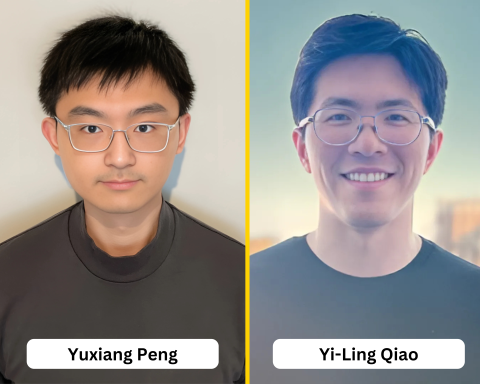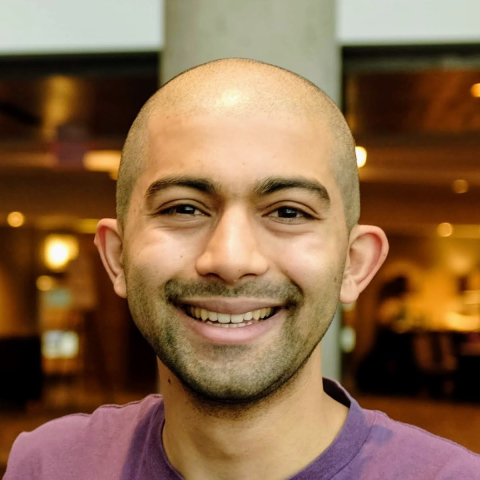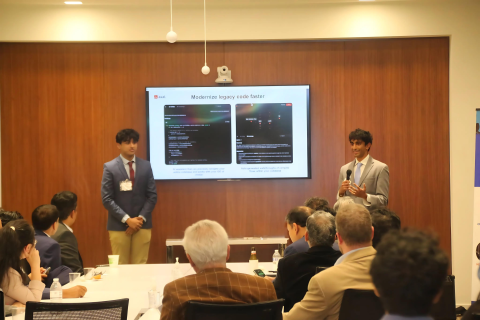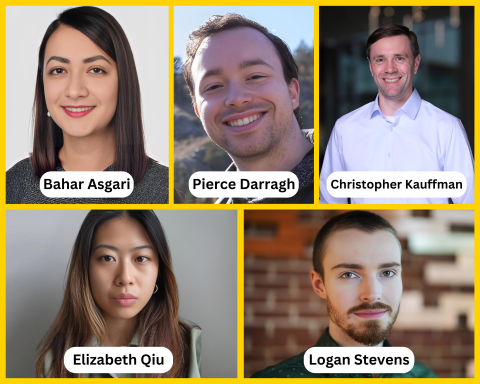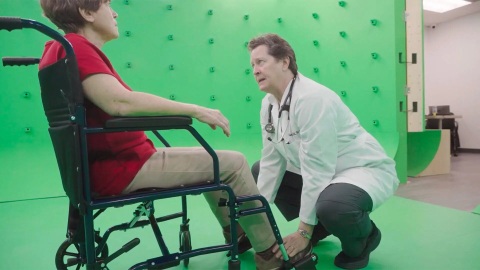Recent News & Accomplishments
2024
He was recognized for his patent on multimodal emotion recognition.
University of Maryland Distinguished University Professor Dinesh Manocha has been awarded the 2024 Jimmy Lin Award for Innovation and Invention . Manocha, who holds joint appointments in the Department of Computer Science and the Department of Electrical & Computer Engineering , was honored for his patent, "System and Method for Multimodal Emotion Recognition." The award recognizes individuals who have transformed their ideas into innovations through invention and technology commercialization. The Jimmy Lin Endowment for Innovation and Invention annually presents the award to faculty,... read more
UMD experts explain the emotional and cognitive challenges, offering strategies to avoid them.
Artificial though it may be, the concept of “intelligence” doesn’t seem to jibe with a computer-generated image of uniformed cats toting assault rifles. Yet that visual slur, which supports a debunked story about immigrants in Ohio eating pets, has become a signature image from the 2024 U.S. presidential election. It was created using artificial intelligence (AI) by supporters of Republican nominee Donald Trump and circulated online by the former president himself. As the first election to play out in the era of widespread access to generative AI—which can create seemingly original content—... read more
Yuxiang Peng and Yi-ling Qiao each received the award for the 2024–25 academic year.
The University of Maryland’s Department of Computer Science has announced the recipients of the 2024-25 Larry S. Davis Doctoral Dissertation Award. Yuxiang Peng (Ph.D. '24, computer science), who will join Purdue University in fall 2025, and Yi-ling Qiao, a fifth-year computer science Ph.D. student in UMD’s GAMMA Group , received the award, which recognizes dissertations for their technical depth, significance, potential impact and presentation quality. Named after Professor Emeritus Larry S. Davis , the award honors students who showcase innovative work in computer science. Davis, who served... read more
Laxman Dhulipala secures grant to develop open-source tools for enhanced data analysis through clustering algorithms.
Modern datasets are massive—they can contain billions of values and an overwhelming amount of information. The data itself is invaluable and can provide vital insights, but how can we efficiently make sense of it? Laxman Dhulipala , an assistant professor of computer science with a dual appointment in the University of Maryland Institute for Advanced Computer Studies (UMIACS), is building open-source tools to help researchers do just that. He is part of a multi-institutional team that has been awarded $364K from the National Science Foundation to help us better understand complex data using... read more
The ABC show’s first lead highlights dating in later years.
Before she was handing out roses to 24 eligible suitors at the famous Bachelor Mansion, the dating scene for Joan Vassos (B.S. ’85, computer science) consisted of Delta Gamma formals or meetups at College Park bars. The University of Maryland alum last fall appeared on the debut season of “The Golden Bachelor,” a senior spinoff of ABC’s long-running series “The Bachelor,” where contestants vie for the affections of the lead—and often a proposal. After leaving the show early to help a daughter struggling with postpartum depression, Vassos was named the first “Golden Bachelorette,” relishing... read more
Eric Bennett, a computer science major, and his friend Chris Moon turned their decade-long bond into Chris and Eric's Small Batch Pickles.
University of Maryland computer science major Eric Bennett and his friend Chris Moon initially met playing the drums in sixth-grade band class. After ten years of friendship, becoming business partners was a natural next step for the two University of Maryland juniors. From band class to McKeldin Mall, a fully student-run startup was born: Chris and Eric’s Small Batch Pickles. “Pickles specifically, there this thing that everyone eats, but no one really makes their own pickles,” said Bennett. In between classes and their professional business fraternity, Alpha Kappa Psi, Moon — a junior... read more
UMD students Samai Patel, Nand Vinchhi, and MIT’s Veer Gadodia leverage AI to help companies modernize outdated systems.
For many companies, decades-old software code can be more of a liability than an asset. As technology rapidly advances, maintaining these outdated systems—built using programming languages that are no longer taught and supported—has become an expensive and time-consuming challenge. In today’s fast-paced environment, businesses struggle to keep up with competitors due to the constraints of legacy systems that were once at the forefront of innovation but are now holding them back. Axal , a startup formed by University of Maryland students, seeks to address these challenges. Led by UMD computer... read more
Bahar Asgari, Pierce Darragh, Christopher Kauffman, Elizabeth Qiu and Logan Stevens received teaching awards in four categories.
The University of Maryland's Department of Computer Science recognized its outstanding educators for the 2023-24 academic year, awarding Bahar Asgari , Pierce Darragh , Christopher Kauffman , Elizabeth Qiu and Logan Stevens for their contributions in four distinct categories. Each year, the department honors professors, instructors, STIC facilitators and teaching assistants through a nomination and selection process designed to identify exceptional teaching and mentorship. The recipients were chosen through student nominations, typically collected mid-spring, followed by a review and... read more
Researchers in the University of Maryland’s Center for Bioinformatics and Computational Biology (CBCB) have just published research that may soon help doctors better diagnosis patients with Parkinson’s disease. Their work, done in tandem with researchers at the University of Maryland, Baltimore and others, uses machine learning algorithms to analyze data from wearable sensors that track movement. Ultimately, the researchers say, this can lead to more accurate and earlier diagnoses of people suffering from Parkinson’s, which in turn can lead to earlier therapeutic interventions. Rana Khalil, a... read more
The physician assistant program at UMB will introduce new technology for stroke assessment.
The 76-year-old patient in the doctor’s office suddenly becomes mute and can’t move her right arm—classic symptoms of a stroke. Cheri Hendrix, director of the physician assistant (PA) program at the University of Maryland, Baltimore goes into assessment mode, her voice growing urgent. “Tell me what day it is,” she says as she checks for a heart rate. “Tell me where you are.” The scene isn’t playing out in real life. It’s a 3-D training simulation representing a common stroke scenario. Soon, PA program students outfitted with virtual reality (VR) goggles will be able to immerse themselves in... read more


